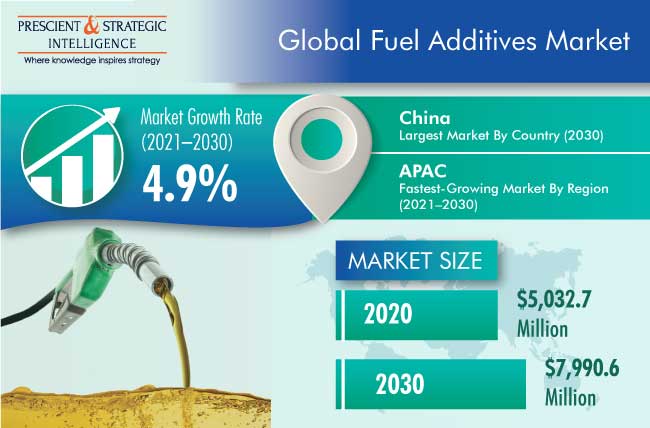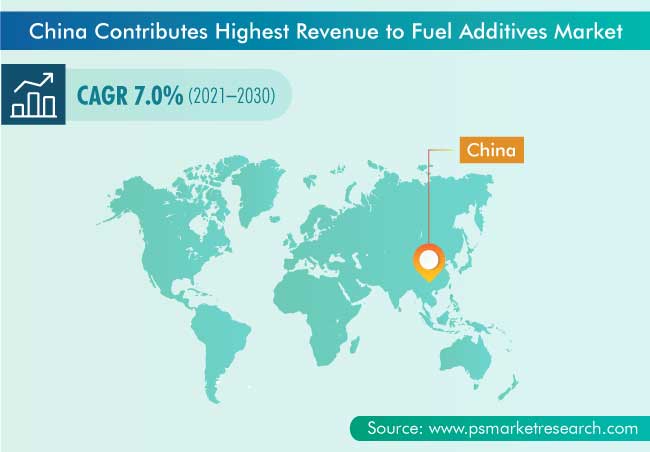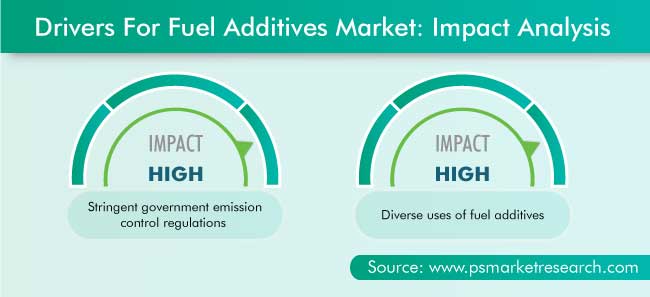Report Code: 12234 | Available Format: PDF | Pages: 239
Fuel Additives Market Research Report: By Type (Deposit Control, Cetane Improver, Cold Flow Improver, Icing Inhibitor, Lubricity Additive, Antioxidant), Application (Diesel, Gasoline, Aviation Fuel, Marine Fuel), End Use (Automobile, Aviation, Marine, Industrial) - Global Industry Analysis and Growth Forecast to 2030
- Report Code: 12234
- Available Format: PDF
- Pages: 239
- Report Description
- Table of Contents
- Market Segmentation
- Request Free Sample
Market Overview
The global fuel additives market was valued at $5,032.7 million globally in 2020, and it is expected to grow at a CAGR of 4.9% during the forecasted period of 2021–2030. The major factors driving the growth of the market are the stringent government emission-control regulations and diverse uses of fuel additives.
During the COVID-19 pandemic, there was a negative impact on the demand for fuel additives in 2020 due to their disrupted supply chain. Because of the lockdown in several nations, there was a severe hindrance in the distribution of fuel additives, which is attributed to the suspension of their production. The impact of the COVID-19 pandemic has been felt on almost every industry across the world, including automotive, aviation, and marine, where the operations were halted or reduced in order to curtail the spread of the disease. This led to a massive reduction in the demand for fuels following the economic slowdown, due to which oil refineries were also temporarily closed, which, in turn, led to a decrease in the production and demand for fuel additives.
Consumers’ spending and fuel consumption have been at an all-time low, as lockdown protocols have been keeping people inside their homes. The market may require substantial time to recover from the ill effects of the pandemic, which makes the future scenario quite uncertain.

Deposit Control Additives Dominated Fuel Additives Market in 2020
The deposit control category accounted for the largest value share in 2020 in the fuel additives market, based on type. The category is further projected to continue leading the market during the forecast period. This is majorly attributed to the multifunctional use of such additives, which is why companies in the market prefer producing them in high volumes. Furthermore, these products are used both for gasoline and diesel fuel, which is why the demand for them is predicted to continue to be high during the forecast period.
Diesel Category Accounted for Largest Market Share in 2020
The diesel category accounted for the largest market share, in terms of value, in 2020, which is expected to further increase at a healthy rate during the forecast period, on the basis of application. This is attributed to the high preference of people for diesel vehicles over those running on gasoline. Moreover, diesel finds a much wider usage in generators and as a marine fuel.
Asia-Pacific (APAC) Is Expected To Retain Its Top Position during Forecast Period
APAC led the global fuel additives market in 2020, and it is expected to remain the largest market during the forecast period. This is attributed to the growth of the petrochemical industry in the region. Moreover, China holds the largest share in the regional market because of the continuous research and development (R&D) in such products and growing automobile industry.

Launch of New Products by Market Players Is Key Trend
The major trend in the market for fuel additives is the launch of products by market players to expand their portfolio and increase their market share. Many fuel additive manufacturers are launching new products for both gasoline and diesel. Additionally, a number of players are focusing on antifreeze products to cater to consumers in countries where the fuel often freezes due to cold weather. This fuel additive can be used to control the operating temperature in hot-running and high-revving powersports applications.

Stringent Government Emission-Control Regulations Are Driving Market Growth
Globally, governments are enforcing strict environmental laws to protect nature, by reducing greenhouse gas (GHG) emissions, which will increase the need for cleaner fuels. For instance, the Environmental Protection Agency (EPA) has mandated that there must be a certain amount of additives in a fuel and all the fuel additives must be registered with the EPA prior to selling. Additionally, the Federal Energy Policy Act of 2005 set a fixed limit on the number of boutique fuels that the EPA can approve. Therefore, the concern for the environment and the strict government laws being implemented in this regard are driving the fuel additives market.
Diverse Uses of Fuel Additives Are also Propelling Market
The diverse usage of fuel additives is propelling the growth of the market, since fuel additives are not only used to lower the level of emissions but for numerous other purposes. Some additives help control deposits and improve the cetane and octane numbers, while some are used as corrosion inhibitors and to improve the flow of the fuel. Additives are also used to prevent the fuel from freezing in cold countries and reduce the friction between the fuel molecules and walls of the engine, for good lubricity.
| Report Attribute | Details |
Historical Years |
2014-2020 |
Forecast Years |
2021-2030 |
Base Year (2020) Market Size |
$5,032.7 Million |
Market Size Forecast in 2030 |
$7,990.6 Million |
Forecast Period CAGR |
4.9% |
Report Coverage |
Market Trends, Drivers, and Restraints; Revenue Estimation and Forecast; Segmentation Analysis; Country Breakdown; Impact of COVID-19; Companies’ Strategic Developments; Company Profiling |
Market Size by Segments |
By Type; By Application; By End Use; By Region |
Market Size of Geographies |
U.S; Canada; Germany; France; U.K.; Italy; Spain; Japan; China; India; South Korea; Brazil; Mexico; Saudi Arabia; South Africa; Turkey |
Secondary Sources and References (Partial List) |
BASF SE; Clariant International Ltd.; Evonik Industries AG; Total S.A.; Exxon Mobil Corporation; Croda International Plc; Chevron Corporation; The Lubrizol Corporation; Afton Chemical Corporation; Innospec Inc.; Lanxess AG; Infineum International Limited; Mitsubishi Gas Chemical Company Inc.; Thermax Limited; Songwon Industrial Group. |
Explore more about this report - Request free sample
Market Players Involved in Mergers and Acquisitions to Gain Significant Position
The fuel additives market is fragmented in nature due to the presence of several key players. Major players in the industry include BASF SE, Clariant International Ltd., Evonik Industries AG, Total S.A., Exxon Mobil Corporation, Croda International Plc, Chevron Corporation, The Lubrizol Corporation, Afton Chemical Corporation, Innospec Inc., Lanxess AG, Infineum International Limited, Mitsubishi Gas Chemical Company Inc., Thermax Limited and Songwon Industrial Group.
In recent years, players in the fuel additives market has been involved in partnerships and acquisitions in order to attain a significant position. For instance:
- In July 2020, Clariant International Ltd. partnered with Ineratec GmbH, which is an energy equipment and solution provider, in order to produce and commercialize renewable fuels and chemicals. Clariant is providing the catalyst to convert carbon dioxide to valuable chemicals, fuels, and additives. This partnership enhanced the operations of Clariant International Ltd. and provided it with the opportunity to produce and market environment-friendly products.
- In May 2020, The Lubrizol Corporation joined a group endorsed by 14 governments and composed of more than 100 organizations, ‘Getting to Zero Coalition’, to provide low- or zero-carbon fuels.
Key Players in Global Fuel Additives Market Include:
-
BASF SE
-
Clariant International Ltd.
-
Evonik Industries AG
-
Total S.A.
-
Exxon Mobil Corporation
-
Croda International Plc
-
Chevron Corporation
-
The Lubrizol Corporation
-
Afton Chemical Corporation
-
Innospec Inc.
-
Lanxess AG
-
Infineum International Limited
-
Mitsubishi Gas Chemical Company Inc.
-
Thermax Limited
-
Songwon Industrial Group.
Market Size Breakdown by Segments
The fuel additives market report offers comprehensive market segmentation analysis along with market estimation for the period 2015-2030.
Based on Type
- Deposit Control
- Cetane Improver
- Cold Flow Improver
- Icing Inhibitor
- Lubricity Additive
- Antioxidant
Based on Application
- Diesel
- Gasoline
- Aviation Fuel
- Marine Fuel
Based on End Use
- Automobile
- Aviation
- Marine
- Industrial
Geographical Analysis
- North America
- U.S.
- Canada
- Europe
- Germany
- France
- U.K.
- Italy
- Spain
- Russia
- Asia-Pacific (APAC)
- Japan
- China
- India
- South Korea
- Latin America (LATAM)
- Brazil
- Mexico
- Middle East and Africa (MEA)
- Saudi Arabia
- South Africa
- Turkey
The market for fuel additives will value $7,990.6 million in 2030.
The fuel additives industry generates the highest revenue from the sale of deposit-control additives.
APAC is the largest market for fuel additives in the world.
The key drivers for the fuel additives industry are the strict emission control regulations and multiple uses of such products.
The market for fuel additives has a fragmented competitive landscape.
Want a report tailored exactly to your business strategy?
Request CustomizationWant an insight-rich discussion with the report author?
Speak to AnalystOur dedication to providing the most-accurate market information has earned us verification by Dun & Bradstreet (D&B). We strive for quality checking of the highest level to enable data-driven decision making for you
Our insights into the minutest levels of the markets, including the latest trends and competitive landscape, give you all the answers you need to take your business to new heights
With 24/7 research support, we ensure that the wheels of your business never stop turning. Don’t let time stand in your way. Get all your queries answered with a simple phone call or email, as and when required
We take a cautious approach to protecting your personal and confidential information. Trust is the strongest bond that connects us and our clients, and trust we build by complying with all international and domestic data protection and privacy laws